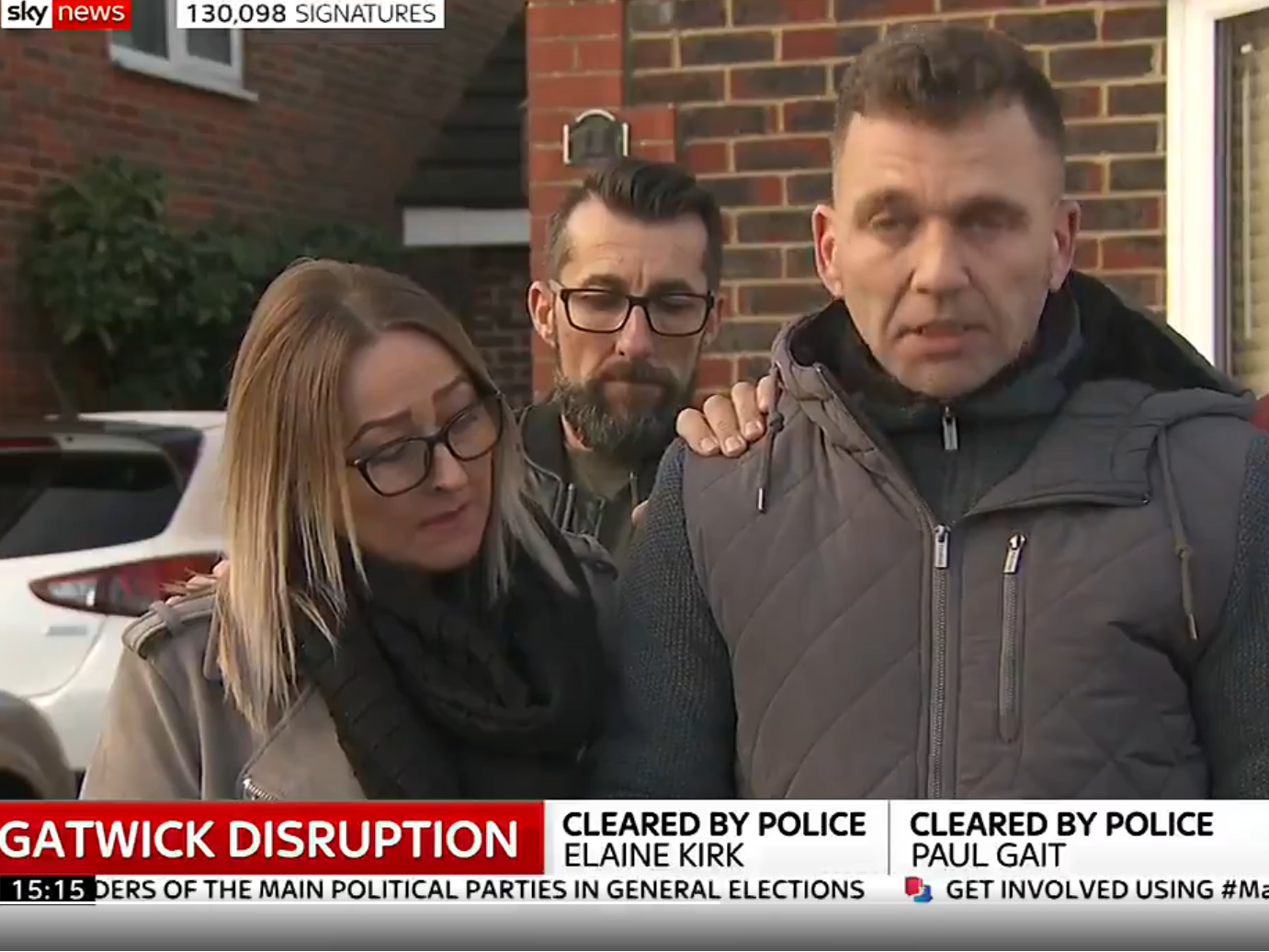
A couple wrongly arrested after drones brought Gatwick Airport to a standstill in the run-up to Christmas could have “strong claims” for invasion of privacy, according to a media law specialist.
It follows Sir Cliff Richard’s privacy win against the BBC last summer over its coverage of a police raid on his home as officers probed historical allegations of sex abuse made against him – later dropped entirely.
Paul Gait, 47, and his wife Elaine Kirk, 54, were named and pictured on the front pages of four national Sunday newspapers on 23 December as Sussex Police detained them in connection with the drone chaos.
Among those to splash on the story of their arrest was the Mail on Sunday, which asked: “Are these the morons who ruined Christmas?”
But the pair (pictured) were released without charge after 36 hours as police dropped them from their inquiry. In a joint statement, they described “feeling completely violated” by press coverage of their arrest.
There have yet to be any further arrests after sightings of drones near a runway grounded some 1,000 flights between 19 and 21 December last year.
Solicitor Mark Stephens, a partner with law firm Howard Kennedy, told PA: “A lot of newspapers either named the couple, or published enough information to make them identifiable.
“The couple would now have strong claims for invasion of privacy following the Cliff Richard case and for damages for the diminution of reputation they will have suffered as a result of the coverage.
“They could find it very difficult to keep living where they are at present.”
The pair could also have a claim against Google and other search engines to ensure that all references to them are de-listed from search results under the so-called “Right to be Forgotten”.
“They would have a claim for that because they had nothing to do with the Gatwick drone sightings, and because they therefore have not been fairly treated,” Stephens said.
On Christmas Eve, daily newspapers including the Times, Daily Mail and Daily Mirror used their front pages to describe police handling of the incident as a “farce” and “shambolic”.
The couple’s treatment has reignited the debate over whether newspapers should identify suspects in a police investigation before charges are brought against them, sparked by the BBC’s coverage of a police raid on Sir Cliff’s Berkshire home.
Conservative MP Anna Soubry is among those calling for a “Cliff’s Law”, which would make it illegal for suspects to be named before they are charged.
Sir Cliff won a privacy battle against the BBC last summer after it broadcast footage of the raid – including from a helicopter – as police probed claims of historical child sex abuse made against him.
The 78-year-old singer was never arrested or charged and the case against him was later dropped. He was awarded £210,000 in damages after pursuing a privacy case in the High Court.
In his ruling handed down in July, judge Mr Justice Mann said Sir Cliff had privacy rights in respect to the police investigation and that the BBC infringed those rights without a legal justification.
He also rejected the BBC’s case that it was justified in reporting the raid under its rights to freedom of expression and freedom of the press.
BBC news director Fran Unsworth said the judgment marked a “dramatic shift against press freedom” but the BBC did not appeal the ruling.
Instead it has asked the Government to review the law around the reporting of criminal investigations and the naming of those under investigation, although it has yet to receive a reply.
Sussex Police has said that “when people are arrested in an effort to make further enquiries, it does not mean that they are guilty of an offence” and that it would not make the identities of suspects public.
Naming people “locally” – through unofficial sources – is a common practice in the media as reporters on the ground learn more about a story and share this new information with the public.
Gill Phillips, the Guardian’s director of editorial legal services, told a media law conference last month that there had been a “shift” away from defamation and towards privacy in claims against news publications.
“We can see how this is starting to become an all-embracing thing that’s knocking out what we used to think of as truth being the real decider in these things,” she said.
“Privacy is giving people damages that are not far off defamation damages and are being used in cases that were once a defamation scenario.”
She said this change was in part because it was a “much easier road” for claimants as there is no threshold for harm and no time limit on privacy claims (libel claims must be filed within a year of publication).
“The public interest is becoming the key thing, and not the truth,” said Phillips.
But she warned this was creating “uncertainty for journalists” with public interest guidelines only appearing in codes of conduct from press regulators such as the Independent Press Standards Organisation.
Phillips said the shift towards privacy and away from defamation, where truth is a defence, was “creating quite a hard environment journalistically”.
Email pged@pressgazette.co.uk to point out mistakes, provide story tips or send in a letter for publication on our "Letters Page" blog
